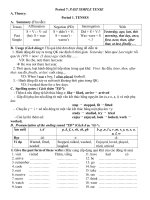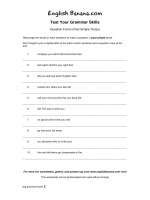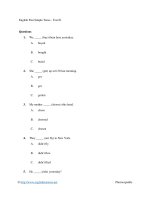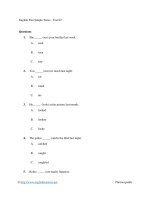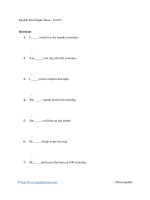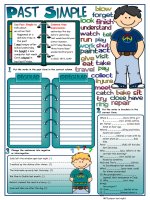Past simple tense lớp 8
Bạn đang xem bản rút gọn của tài liệu. Xem và tải ngay bản đầy đủ của tài liệu tại đây (131.79 KB, 9 trang )
Irregular Verbs
1
2
3
4
5
6
7
8
9
10
11
12
13
14
15
16
17
18
19
20
21
22
23
24
25
26
27
28
29
30
31
32
33
34
Infinitive
(=Base form)
be (am,is,are)
become
begin
blow
break
bring
build
burst
buy
can
catch
choose
come
cost
cut
do
draw
drink
drive
eat
fall
feed
feel
fight
find
fly
forget
forgive
freeze
get
give
go
grow
hang
Past tense
was, were
became
began
blew
broke
brought
built
burst
bought
could
caught
chose
came
cost
cut
did
drew
drank
drove
ate
fell
fed
felt
fought
found
flew
forgot
forgave
froze
got
gave
went
grew
hung
Past
Participle
been
become
begun
blown
broken
brought
built
burst
bought
caught
chosen
come
cost
cut
done
drawn
drunk
driven
eaten
fallen
fed
felt
fought
found
flown
forgotten
forgiven
frozen
gotten
given
gone
grown
hang
Meaning
thì, là, ở
trở nên
bắt đầu
thổi
bể, làm vỡ
mang
xây dựng
nổ, nổ tung
mua
có thể
chụp, bắt
lựa chọn
đến
trị giá
cắt
làm
vẽ
uống
lái xe
ăn
rơi, té, ngã
cho ăn, ni
cảm thấy
chiến đấu
tìm thấy
bay
qn
tha thứ
đơng lại, ướp
có được, trở nên
cho, biếu, tặng
đi
mọc, lớn lên
treo
35
36
37
38
39
40
41
42
43
44
45
46
47
48
49
50
51
52
53
54
55
56
57
58
59
60
61
62
63
64
65
66
67
68
69
70
71
72
73
have
hear
hide
hit
hold
hurt
keep
know
lay
lead
lean
learn
leave
lend
let
lie
light
lose
make
may
meet
must
pay
put
read
ride
ring
rise
run
Say
See
Sell
send
Set
shake
shall
shine
shoot
show
had
heard
hid
hit
held
hurt
kept
knew
laid
led
leant
learnt
left
lent
let
laid
lighted
lost
made
might
met
had to
paid
put
read
rode
rang
rose
ran
said
saw
sold
sent
set
shook
should
shone
shot
showed
had
heard
hidden
hit
held
hurt
kept
known
laid
led
leant
learnt
left
lent
let
lain
lit
lost
made
met
paid
put
read
ridden
rung
risen
run
said
seen
sold
sent
set
shaken
shone
shot
shown
có
nghe, nghe thấy
che dấu, ẩn nấp
đánh, đụng, va
cầm, tổ chức
làm đau, đau
giữ, giữ gìn
biết
đặt, đẻ (trứng)
dẫn dắt, lãnh đạo
nghiêng, dựa vào
học
rời đi, để lại
cho mượn
để cho
nằm
thắp sáng
đánh mất, lạc
làm, chế tạo
được phép, có lẽ
gặp
phải
trả tiền
đặt, để
đọc
cưỡi, đi (xe)
rung, reo
dâng lên
chạy
nói
nhìn thấy, thấy
bán
gởi
đặt, để
rung, lắc
sẽ, nên
chiếu sáng
bắn, sút (bóng)
chỉ, cho xem
74
75
76
77
78
79
80
81
82
83
84
85
86
87
88
89
90
91
92
93
94
95
96
97
98
99
100
Shut
Sing
Sink
Sit
sleep
smell
speak
spend
split
spread
stand
steal
strike
sweep
swim
take
teach
tear
tell
think
throw
understand
wake
wear
will
win
write
shut
sang
sank
sat
slept
smelt
spoke
spent
split
spread
stood
stole
stroke
swept
swam
took
taught
tore
told
thought
threw
understood
woke
wore
would
won
wrote
shut
sung
sunk
sat
slept
smelt
spoken
spent
split
spread
stood
stolen
stricken
swept
swum
taken
taught
torn
told
thought
thrown
understood
waken
worn
won
written
đóng lại
hát
chìm xuống
ngồi
ngủ
ngửi
nói
tiêu, xài, trải qua
chẻ, nứt
trải ra, lan đi
đúng
đánh cắp
đánh, đình cơng
qt
bơi
cầm lấy
dạy
xé rách
kể lại, nói
nghĩ, suy nghĩ
ném, quăng
hiểu
thức dậy
mặc, mang, đội
sẽ
thắng cuộc
viết
Regular Verbs
Cách thêm đuôi “ ed” trong các động từ có qui tắc.
- Động từ tận cùng đã là “e + d”: hope – hoped, arrive – arrived,…
- Động từ tận cùng là “ y” thì “đổi y thành i + ed”: carry – carried,………….
- Động từ một âm tiết tận cùng là một phụ âm và trước nó là một ngun âm
ta phải gấp đơi phụ âm trước khi thêm ed: stop – stopped, beg – begged,…
5 nguyên âm u, e, o, a, i và 21 phụ âm b , c , d , f , g , h , j , k , l , m , n ,
p , q , r , s , t , v , w , x , y , z.
Cách phát âm đuôi “ ed”:
- /id/: Khi tận cùng của động từ có chứa “ t, d”: want – wanted, decide –
decided,… (tiền đô)
- /t/ : Khi động từ có tận cùng là: “ k, θ, p, f (gh), s (ce), ch, sh ”: look – looked,
stop – stopped,… (Kon thỏ Phập Fhòng Sợ CHó SHói)
- /d/ : Tận cùng là các nguyên âm và phụ âm còn lại trừ hai trường hợp trên:
arrive – arrived,…
Động từ To be
Câu khẳng
định
Ex
Động từ thường
S + was/ were + ……
S + V-ed
She was in Hanoi last week.
He played soccer yesterday.
Example
→ Anh ấy đã chơi bóng đá vào ngày hôm qua.
I bought a bag yesterday.
We use the past tense to talk about:
→ Cô ấy đã ở Hà Nội vào tuần trước.
Diễn tả hành động đã xảy ra và chấm dứt hoàn toàn trong quá
khứ.
Câu phủ định
S + was/ were + not + ……
(-)
Diễn tả một loạt các hành động xảy ra liên tiếp trong quá khứ
She wasn’t in Hanoi last week.
Ex
→ Cô ấy đã không ở Hà Nội vào tuần
trước.
Diễn tả hành động lặp đi lặp lại và đã kết thúc trong quá khứ.
Câu nghi vấn
Was/ Were+ S + V?
(?)
Tôi not
đã mua
S–>
+ did
+ V một cái túi vào hôm qua.
I went to the company, then I joined a meeting.
He didn’t play soccer yesterday.
–> Tôi đã đến công ty và sau đó tham dự một cuộc
họp.
→
Anh ấy khơng chơi bóng đá vào hôm qua.
I usually visited museums when I was a child.
Did
+ S thường
+ V? đi tham quan viện bảo tàng khi tơi
–> Tơi
cịn nhỏ.
Was she in Hanoi last week?
Diễn
tả
1
hành
động
chen ngang 1 hành động khác đang xảy ra
Ex
→
Cô ấy đã ở Hà Nội tuần trước đúng
trong quá khứ
không?
Did he play soccer yesterday?
Alex was baking cookies when I came back home.
→ Anh ấy đã chơi bóng đá hơm qua đúng
khơng?
–> Alex đang nướng bánh khi tôi trở về nhà.
Wh-question
Whkiện
+ was/
Sử dụng trong câu điều
loạiwere
II + S + V-inf + …?
Wh+
did +you,
S +IV-inf
….?it.
If I were
would+ buy
Why
was she
→ If + Quá khứ đơn,
would
+ V in Hanoi last week?
Ex
→ Vì
sao cơ
Hà Nội
Sử dụng trong câu ước
khơng
có ấy
thậtở (câu
ướctuần
loại trước?
2)
Where
yesterday?
–> Nếudid
tơihe
là play
bạn, soccer
tơi sẽ mua
nó.
→ S + wish (that)+ S + V2/ed
→
Hômmy
quamother
anh ấywas
đã chơi
I wish
here bóng
now. đá ở đâu?
–> Tơi ước mẹ tơi đang ở đây bây giờ.
Alexander Graham Bell invented the telephone.
Sử dụng để mơ tả sự kiện mang tính lịch sử.
–> Alexander Graham Bell đã phát minh ra điện
thoại.
1. It’s time I started to look for new opportunities.
Dùng trong một số cấu trúc khác:
→ It’s + (high) time + S + V(ed)
→ It is + khoảng thời gian + since + thì quá khứ
→ Đã đến lúc tơi bắt đầu tìm kiếm những cơ hội
mới rồi.
2. It has been three months since Daniel sold his
house.
→ Đã ba tháng kể từ khi Daniel bán căn nhà của
anh ấy.
Task 1:
1. What she _________ (do) last night? – She _________ (do) her homework.
2. My brother_________ (not/use) the computer yesterday.
3. She _________ (live) in Hanoi.
4. Helen _________ (read) the newspaper last night.
5. He _________ (forget) something?
6. I _________ (go) to the supermarket after school.
7. You _________ (see) Anne’s cat yesterday?
8. She was very sad, so she _________ (leave) the office early.
9. Jack _________ (get) married last month?
10. Last week I _________ (visit) Temple of Literature in Ha Noi.
11. Hasley _________ (eat) pumpkin soup for dinner.
12. My sister _________ (go) to the zoo yesterday.
13. Kate _________ (have) a great time in Paris last summer.
14. What she _________ (eat) for dinner yesterday?
15. I _________ (buy) many souvenirs for my parents.
16. My brother _________ (write) my mother several letters.
17. Helen _________ (help) me with my homework last week.
18. I _________ (return) to Seoul yesterday.
19. She _________ (go) to the club with a stranger yesterday.
20. She _________ (prepare) dinner with her mother yesterday.
Task 2:
Once upon a time, in a village there _________ (live)1 a beautiful girl named
Cinderella with her stepmother and two step sisters. She _________
(work)2 hard all day. One day, they all _________ (go)3 to a ball in the palace,
leaving Cinderella behind. Cinderella _________ (is)4 feeling sad. Suddenly
there _________ (is)5 a burst of light and the fairy godmother _________
(appear)6.
With a flick of the magic, she _________ (turn)7 Cinderella into a beautiful
princess with glass slippers and a horse carriage _________ (appear)8 at the
door. The fairy godmother _________ (warn)9 Cinderella to return before
midnight. Cinderella _________ (arrive)10 at the ball, the prince _________
(see)11 her and _________ (fall)12 in love with her.
They _________ (dance)13 together all night, as the clock struck twelve,
Cinderella _________ (rush)14 out to her carriage leaving one of her slippers
behind.
The prince _________ (go)15 to every house in the town with the slipper until
he found Cinderella. The prince and Cinderella _________ (live)16 happily
ever after.
Task 3. Bài tập viết lại câu: Từ hiện tại đơn sang quá khứ đơn
1. I have breakfast at 7 o’clock.
2. Lily buys a lot of books.
3. They get up at 6 o’clock.
4. Jack closes the door.
5. I spend two hours making a pizza every weekend.
6. The sofa is very uncomfortable.
7. My mother cooks beefsteak for lunch.
8. Leo plays badminton in the park.
9. My sister draws a colorful picture.
10. My brother gets up at 8 o’clock.
11. Alex goes to the cinema.
12. Maya listens to music.
13. Daniel stays at home all weekend.
14. Selena sells the black chair at a fair.
15. I go to the zoo.
Task 4. Bài tập viết lại câu: Sang phủ định & Nghi vấn
1. I went to the movies with my boyfriend last night.
2. My mother went to the market yesterday.
3. Mark sent me a letter apologizing for being late for his appointment last
night.
4. I bought a new computer yesterday.
5. I walked to school.
6. He gave me a bouquet of roses.
7. Karty baked a cake last night.
8. My family went to Da Nang to see the fireworks festival last year.
9. I called him to discuss a new project.
10. She invited me to her birthday party.
1. lived
2. worked
3. went
4. was
5. was
6. appeared
7. turned
8. appeared
9. warned
10. arrived
11. saw
12. fell
13. danced
14. rushed
15. went
16. lived
